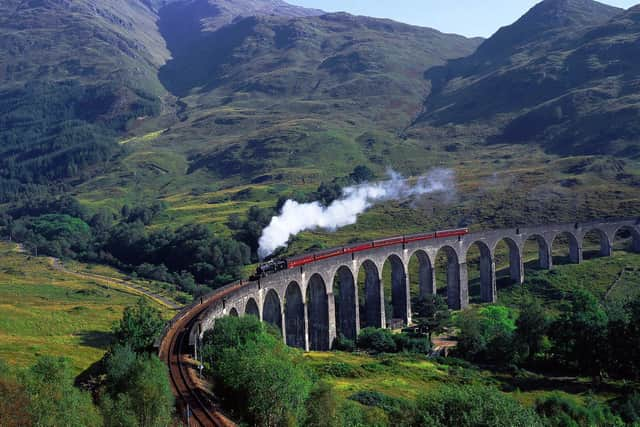Harry Potter fans cause traffic chaos at iconic Hogwarts Express Glenfinnan Viaduct in the Scottish Highlands
But the worldwide popularity of the film series has seen visitor numbers explode in recent years, causing a huge headache for residents and “hazardous” conditions on local roads around the small hamlet of Glenfinnan, in the Lochaber region.
Now a three-year travel management plan has been put forward, with a host of measures aimed at alleviating the pressure. They include number-plate recognition cameras to identify vehicles, extra parking for coaches, a link-up between the two existing car park operators, introduction of double-yellow lines in hot-spots, and a single co-ordinated online public information service with live updates on parking availability and road congestion.
Advertisement
Hide AdAdvertisement
Hide AdGlenfinnan, which is also famous for its links to Bonnie Prince Charlie and the historic 1745 Jacobite Rebellion, has long been popular with sightseers. But numbers have risen tenfold since the Harry Potter films first came out in the early 2000s and have now reached around half a million each year.
The influx has been causing major problems for people living in the village and its surroundings. Countless incidents of dangerous driving, traffic jams, crowds gathering on roads, entrances and exits being blocked and willy-nilly parking on carriageways and verges have been reported as followers of the boy wizard flock to the area to watch the Jacobite tourist train crossing the Glenfinnan Viaduct and capture the moment on camera.
The situation prompted a new investigation into the problems and to identify potential solutions – the findings of which have just been published.
The study, funded by Hitrans, ScotRail, Highland Council, National Trust for Scotland, Glenfinnan Station Museum, Glenfinnan Community Council and West Highland Community Rail Partnership, was carried out by transport specialists Ansons Consulting.
“Hollywood has made Glenfinnan the centre of global attention, and as a consequence the dignity of our beautiful historic village is at risk,” said Glenfinnan resident Hege Hernæs, who co-ordinated the project on behalf of the West Highland Community Rail Partnership.


“This is why we sought the help of imaginative and environment-focused specialists. We have now received Ansons’ report and welcome the many problem-solving proposals.
“The road ahead is still long and arduous because the problems are complex and the stakeholders are many.
“However, the village now has a three-year travel management plan to hand and will be working with neighbouring communities to engage with all the national agencies that have a role to play in addressing the challenges.”
Advertisement
Hide AdAdvertisement
Hide AdThe report stresses that existing facilities should be better managed rather than increased. It states: “Specifically, it is not recommended that additional public transport services (such as park & ride) be developed or additional overspill parking (such as that proposed at Callop) be built in the first instance.”


Alasdair Smart, tourism manager for ScotRail, said: “There’s no doubt that the Glenfinnan Viaduct is a popular attraction, and we’re committed to encouraging more visitors to travel here by rail instead of car.
“It’s important that we continue to work with our key partners on how we can support tourism and bring wider economic benefits along Scotland’s most scenic railways.”
Comments
Want to join the conversation? Please or to comment on this article.